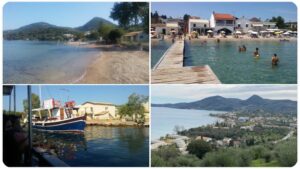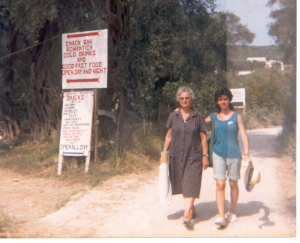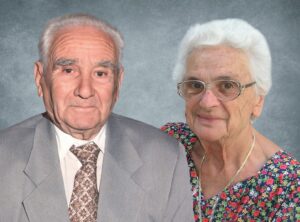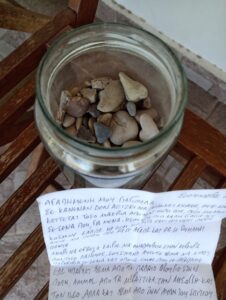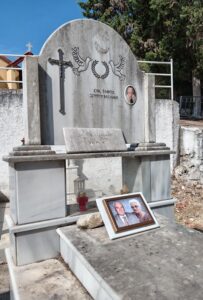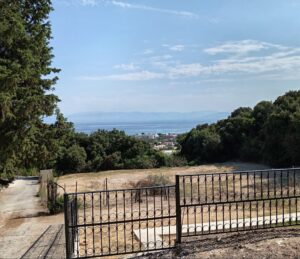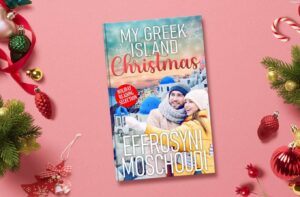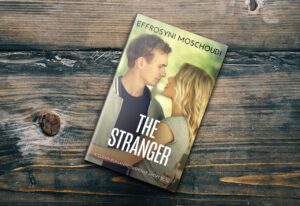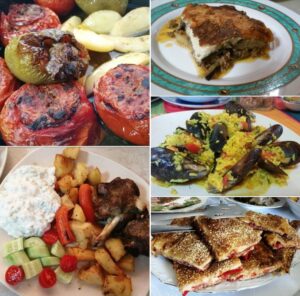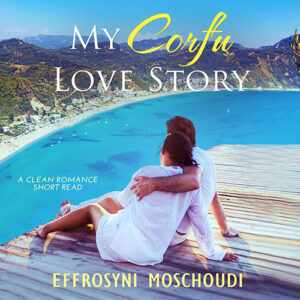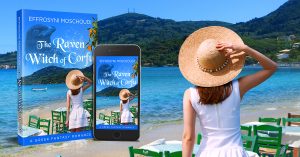Today, I am pouring my heart out, folks, to share a personal account about my late grandmother. Those who have followed me for a while or read my novels, know what she and my late grandfather meant to me.
This summer, like we often do, my husband, Andy, and I spent a little over a week in Moraitika, Corfu. As always, it was a mixture of different things. During that short time, you try to do what you can – you don’t always relax but rather live on the clock. We managed to see only precious few people out of all those we wanted to see, in between trying to get one swim a day and to shape up my grandparents’ crumbling old house as best we could.
This tiny house in the old quarter of Moraitika on the hill is where I used to stay with my grandparents, Spyros and Antigoni Vassilakis, as a young girl, mainly in the 80s.
I aspire to be able to stay there for longer periods in future and make it a comfortable place to stay in. We hope to manage it as of next year when my husband retires from his job. Luckily, me being a writer means I can take my work anywhere.
This summer, Granny’s old fridge packed in from the first day. It was an interesting experience, if anything, to have to shop daily so we could cook and consume the food in its entirety each day.
But, on top of everything else, this odd vacation will forever stay indellible in my memory because I brought to Corfu with me my granny’s old bones. Yes. Literally. Her bones.
Last year, when I visited my father’s homeland – the island of Limnos – I brought Granny’s bones along with me back to Athens in a special metallic box. I kept it in my mother’s grave here all winter.
Granny had passed away in 2016 while staying with my parents on Limnos and was buried there, despite her wish to be buried on Corfu. It was a terrible time for my family, the timing of her passing truly abysmal. Basically, my granny suffered a fall and was commited to hospital on Limnos just as my mother got diagnosed with cancer and had to rush to Athens to start chemo.
I guess, if I ever wrote this in a book people would hound me. They’d never believe these things can happen, and yet they do. At the time, I lost the earth under my feet and felt like the whole world had conspired against me to make sure I would be away from my granny when she needed me the most… I had to be here in Athens for my mother.
And thus, Granny died alone on Limnos while in the care of strangers. The day she left Athens, I even had a premonition I wouldn’t see her again, and as it were, I never did.
All I got as a goodbye was to manage to speak to her on the phone a couple days before her passing. Her blood had been infected after the fall, and she didn’t communicate well verbally. She mumbled that day on the phone a lot, and I couldn’t understand a word she was saying. But then, just as I lost hope, as if it were an act of mercy from Heaven, she spoke a single coherent phrase that I will always cherish:
“May you always be well, kyra mou, may you always be well.”
(“Kyra mou” means “my lady” – it’s a popular term of endearment in Corfu.)
I knew then that Granny was saying goodbye. She had also told my mother a couple days earlier, “Don’t come visit me on Monday, I won’t be here. I’m going to Corfu.” I knew then, too, that she was getting ready to go.
In the evening of Easter Monday, my granny passed away alone in a room having been fed her last meal by a stranger. I can only imagine how sad or afraid she must have felt, despite her confused mind at the time.
But I console myself with the thought that my grandfather, her dearest Spyros, if not her beloved parents too, had come to escort her on her journey to Heaven at her dying hour.
My parents were on Limnos at the time, planning to leave two days later to resume my mother’s chemotherapy in Athens. In record time, they could only arrange for a quick funeral at the village of Lychna, near our family home there. Transportation of Granny’s remains to Corfu was going to take time, effort and personal attendance there – for all of us, at the time, these things were impossible because of my mother’s illness.
Tragically, my Corfiot granny couldn’t have died any further from Corfu since Limnos is on the diametrically opposite edge of Greece – in the northeast Aegean, opposite the shores of Turkey.
Granny, who adored her home in Moraitika and her island, literally used to say, “I don’t want to leave my bones on Limnos.”
And yet, she stayed buried there for eight difficult years, while I took care of my mother in Athens, then my father too, who both suffered greatly with cancer.
Finally, this blessed year, having lost them both, I was able to fulfill my obligation to my granny, this time, to return her bones to Corfu so that she could be buried in the family tomb with my grandfather, who died back in 2010. This was where she wanted to rest.
I placed their wedding wreaths in the grave with them, fullfilling her wishes to the letter.
My inability to complete this task all these years had been a longstanding thorn inside of me, and as it’s all dissolved now, I feel I can share this painful account with you all.
I thought it might provide comfort to anyone who may also feel guilty after the loss of someone dear to them, for whatever reason. Really, we always do what we can do. And no one, not even God, ever expects us to do the impossible.
But even so, after the passing of a loved one, we can still do a small act to honor them and to provide rest for their soul, not to mention solace to our own.
Which brings me to this glass jar that has been very important to me since Granny died…
At the first opportunity after Granny’s passing, I left this jar at her grave on Limnos. Inside it, I placed a handwritten note, as well as dirt and pebbles from various places my granny loved on her island, such as Corfu town, Moraitika, Messonghi, and even from her front yard.
In my note, among other things, I expressed my wish that these contents would help her find comfort in that foreign ground until she could lie with Granddad in Moraitika, as she wanted.
This summer, my trip to Moraitika has been healing for me, and I like to think that it was the same for her soul too. Granny “spent” two nights in her home, the home she always longed to return to, until the priest of Moraitika called me to perform a blessing at the grave where Granddad was buried.
After that, we put Granny’s remains inside.
Once it was all done, the relief I felt was tremendous. I didn’t know what to do with the jar, which I’d brought with me to Corfu. I wanted the contents to be released into the world in a meaningful way that I could remember forever with equal relief.
After much deliberation, I poured the jar contents at our favourite spot on the beach in Moraitika, where Granny used to take me and my sister swimming. Most of the pebbles I had taken from there, anyway.
As for the note, I took it in the water with me folded up in my palm as I swam on my last day. Once it soaked into nothing, I simply opened my hand and let the tiny bits sink down to the seabed. Truly, it made my heart sing, as this jar had become the symbol of my unfulfilled obligation to Granny, the symbol of my pain in a wound that kept gushing open for so long.
And with that, I’ll explain why this is important.
You see, the Greeks have a history of honoring the bones of their dead.
When the Asia Minor Catastrophe took place in 1922, the Greeks who fled from the now Turkish shores (Greek towns at the time), took with them, along with very few belongings, the bones of their dead. They didn’t want them left behind, the graves desecrated by a non-Christian, barbaric enemy.
In the same vein, there are people today who bring back home the bones of their ancestors, who died as emmigrants in faraway lands, even as far as the United States or Australia.
Why? Because in Christian Orthodox belief, the bones are alive–or, rather, have the potentiality to come alive again.
This is a deeply rooted belief in the hearts of the Greek Orthodox.
For one, we believe that from the bones we will rise again at the Second Coming. This is why burial continues to be the number one choice at funerals in Greece and why very few (non-believers, mostly) choose cremation.
We also believe that the dead do not find peace unless their bones rest where they wanted to be buried.
Here, I think it’s apt to refer to the vision of Prophet Ezekiel (chapter 37). During the vision, the prophet walked through a valley filled with dry bones. God spoke to him, and intructed him to talk to the bones and bring them back to life.
Soon, the bones began to come together, nerves and flesh covering them, and then skin formed around them too. And then, came The Holy Spirit and blew life into the bodies, and they rose, alive anew.
A reference to people coming alive from their bones is also made in the Book of Matthew (27:52-53). The moment Jesus died on the cross, an earthquake caused saintly people to rise from their graves, enter Jerusalem and begin to walk among the living.
So, yeah. Bones are important according to the Greeks. Just as the dead are still very much themselves and alive, just not in the physical.
From the plethora of accounts of visions, miracles, and even near death experiences that I have listened to all my life, I actually believe that, in the spiritual realm, the dead are even more alive than we are, and way more powerful than we’ll ever be.
Since the day when I fullfilled my long-standing obligation to my grandparents, I had a dream one night. I was walking to their house, and when I got there, they welcomed me together.
Just as they’d done hundreds of times before, they hugged and greeted me, and kept on laughing with exceptional gaiety. I then looked down at myself and was shocked to find I was naked from the waist up. It caused me great shame to think that on my way there people had seen me in that state, but my grandparents seemed amused by my shock, as if my shame was unfounded, as if they couldn’t see my nakedness.
Needless to say, I awoke with a light heart that morning. The dream signalled to me that they’re happy and I no longer need to feel bad, ashamed, or guilty towards them because they had to wait for so long to rest together, or because I wasn’t there to hold Granny’s hand on her last days.
Finally, now, they lie together as they wanted. And now that I’m back in Athens, I think of their grave on that serene mountainside of Moraitika, and for the first time, I can smile…
To read more about my grandparents and to see old photos, you’re welcome to visit these posts:
A Lifetime of Corfu Summers
Remembering my Grandparents
And, in this post, you can read more about the beliefs (and the Orthodox rituals) of the Greeks pertaining to their deceased:
What is Psychosavato (Soul Saturday)? Learn all about the Greek Orthodox traditions and beliefs about the dead. Wheat berry offerings, the knots bracelet, the soul’s journey to heaven and more
THANK YOU FOR READING! MAKE SURE TO DOWNLOAD MY 3 FREE BOOKS BELOW 🙂 YOU WILL RECEIVE THEM INSTANTLY WITH YOUR SUBSCRIPTION TO MY FUTURE POSTS.
Sharing is caring! Here’s a ready tweet for you to spread some love:
A personal account about my late grandmother from Corfu #writerslife #authorlife #Corfu Share on X
3 FREE books for you! Sign up below to receive them instantly!
NEW! Clean Christmas romance. Single mother Cathy Roussos gave up on love long ago, and veterinarian Alex Rallis doesn’t believe in it, but one magical Christmas on a Santorini farm might just change everything…
Check it out on Amazon Read a FREE sample!
A clean romantic suspense short read with an unreliable narrator that’ll keep you guessing! Vera is losing her mind over famous actor Yannnis Ksenos, except, she isn’t just a fan… Now, she plucks up the courage to ring his doorbell… Visit Amazon
For my delicious Greek recipes, go here.
Planning to visit Greece? Check out my FREE guide to south Corfu!
Have you considered Amazon Prime? Other than offering free shipping on all your orders and fabulous streamed content, you’ll also have access to numerous other services, such as: Free grocery deliveries, free food deliveries with Grubhub+, exclusive medical care and prescription services, and more!
Start your FREE 30-day trial today

